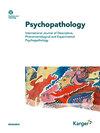发展性精神病理与青少年心理健康关系的意义。
IF 2.2
3区 医学
Q3 PSYCHIATRY
引用次数: 1
摘要
本文章由计算机程序翻译,如有差异,请以英文原文为准。
The Significance of Relationships in Developmental Psychopathology and Youth Mental Health.
Adaptive relationships play a major role in healthy child development. Caregiver-child relationships have the potential to shape a variety of child developmental outcomes, often based on interactions between child biology and the environment. They lay the foundation for the development of secure attachment, social and cognitive abilities, and physical and mental health [1, 2]. Humans are hard-wired to use social proximity as means of regulation [3]. Reciprocal interactions with caregivers help us to form our self-regulatory abilities [4] and positive relationship experiences with caregivers shape the expectations we have towards people in future relationships. Importantly, not only relationships with caregivers but also those with peers are important to our sense of belonging, impacting children’s well-being [5], and are important contributors to the development of social skills such as empathy [6]. There are circumstances which can compromise the ability of parents to form secure relationships with their offspring: caregivers who suffer from mental illness, have experienced childhood maltreatment, or experience ongoing stress and burden may sometimes lack the sufficient resources to respond adequately to their children’s signals and needs. Maladaptive interaction patterns can be important mediators in the process of intergenerational transmission of psychopathology [7]. Moreover, it is important to consider reciprocal associations between vulnerabilities of both parents and their child. Just as parental mental illness and adverse childhood experiences, child characteristics such as temperament and psychopathology shape the caregiver-child relationship and can pose challenges on parenting. From a developmental perspective, children with biological vulnerability who do not experience sufficient co-regulation by their caregivers are more likely to develop difficulties in self-regulation [8]. Moving forward, more dysregulated children often struggle with peer acceptance, which further diminishes the chance of positive relationship experiences. However, if existent, both positive peer relationships as well as positive caregiver-child relationships have the potential to act as important buffers in the presence of problems in the respective opposite relationship area [9, 10]. As such, interpersonal relationships can be both protector and risk in the context of developmental psychopathology.
求助全文
通过发布文献求助,成功后即可免费获取论文全文。
去求助
来源期刊

Psychopathology
医学-精神病学
CiteScore
5.10
自引率
5.60%
发文量
54
审稿时长
>12 weeks
期刊介绍:
''Psychopathology'' is a record of research centered on findings, concepts, and diagnostic categories of phenomenological, experimental and clinical psychopathology. Studies published are designed to improve and deepen the knowledge and understanding of the pathogenesis and nature of psychopathological symptoms and psychological dysfunctions. Furthermore, the validity of concepts applied in the neurosciences of mental functions are evaluated in order to closely bring together the mind and the brain. Major topics of the journal are trajectories between biological processes and psychological dysfunction that can help us better understand a subject’s inner experiences and interpersonal behavior. Descriptive psychopathology, experimental psychopathology and neuropsychology, developmental psychopathology, transcultural psychiatry as well as philosophy-based phenomenology contribute to this field.
 求助内容:
求助内容: 应助结果提醒方式:
应助结果提醒方式:


